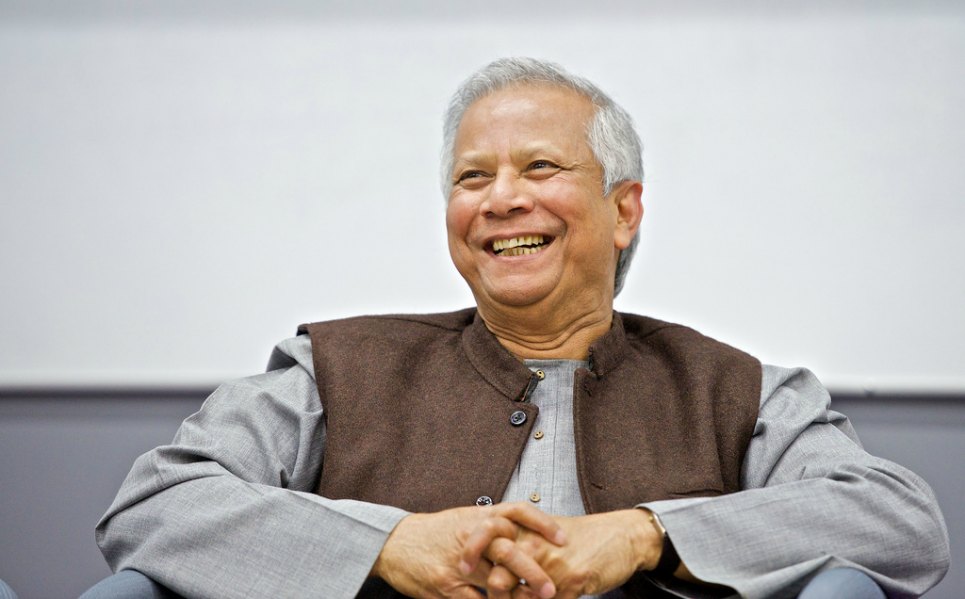What exactly is a social entrepreneur?
According to Investopedia, a social entrepreneur is “a person who pursues an innovative idea with the potential to solve a community problem.”
Take, for example, Muhammad Yunus. Yunus founded his own bank in Bangladesh that allowed those living in poverty to borrow money without having to pay collateral. His ultimate goal in creating this bank was to reduce poverty levels in the area and it was and continues to be quite successful.
To this date, the Grameen Bank has had an extraordinary impact on poverty throughout Bangladesh by doing something as simple as providing banking services to those who would normally be turned away.
Now that we know exactly what a social entrepreneur is and what they set out to do, the next question we need to ask is, what makes a social entrepreneur effective enough to make a large impact? What made Yunus so successful?
If you are struggling with your own business, what differentiates you from some of the successful social entrepreneurs of today?

It all comes down to a handful of powerful personality traits.
If you want to join the ranks of the effective social entrepreneurs, study and incorporate these 13 traits into your personality:
-
Effective Social Entrepreneurs Are… Authentic
Social entrepreneurs are dedicated to their cause and wholly believe that it is their responsibility to do what they can to alleviate social issues such as poverty and the lack of access to education in certain countries. Those who are not invested in a cause and are only interested in making a profit are destined for failure. Effective social entrepreneurs are authentic and seek change, not a paycheck.
How can you avoid becoming a social entrepreneur that is only in the business of change for profit? Make sure that you are truly invested in your cause. Imagine that you have traveled five years in the future and are currently working to support your cause. Have you grown bored with your work? Are you excited about the type of money that you are making? Do you measure your success in checks rather than changes? If you’ve answered yes to any of the above, chances are that you not dedicated to your cause and will not be effective in your efforts.
-
Effective Social Entrepreneurs Are… Prepared
Social entrepreneurs, although goal oriented, know what it takes to run a successful business. Before they launch their business, they’ve constructed an ironclad plan that will ensure the longevity and impact of their business. They’ve done their homework and they are prepared for any obstacles that may come their way while they are running their business. The most successful of social entrepreneurs are prepared for the business side of their goals.
You may or may not have heard of Blake Mycoskie but you have most certainly heard of his company TOMS. TOMS is a company that produces shoes, clothing, and accessories for men and women. For every shoe or product bought, the company gives away water, shoes, and other types of materials and services to those who are in need. TOMS was and continues to be very successful in its efforts.
This success can mostly be attributed to Mycoskie’s entrepreneurial background. Prior to founding TOMS, Mycoskie successfully founded and ran five different businesses. His experience goes as far back as 1996 when he founded a laundry service for Southern Methodist University called EZ Laundry. Until the creation of TOMS, he also founded a billboard company, a cable network, an online driver’s education service, and a marketing firm.
Without this essential business experience, who knows where Blake Mycoskie’s company TOMS would be today.
-
Effective Social Entrepreneurs Are… Collaborative
No business functions well if a single person is attempting to control it or do all the work necessary to keep it running. Social entrepreneurs are well aware of this truth and have a large team by their side to help them achieve their goals and fight for their cause. They allow people to help them out and welcome ideas presented by others who share similar philosophies and values. An effective social entrepreneur knows to collaborate with others rather than trying to take on the world by themselves.
Need some networking tips that will help you become more collaborative? Take a look at some of the ideas below.
- Reach out to people who have a large audience and who are dedicated to your cause.
- Seek out family, friends, and acquaintances. These people will be your greatest assets during your entrepreneurial journey and may just have the skill sets that you require to steer your organization in the right direction.
- Judge someone by their talent, not their status. While someone may have had 10 years of experience at a tech company and founded their own organization, it does not mean that they will always be the right fit for your cause. You may end up with someone who is uneducated but who has the skills you need to be successful.
- Be kind and generous. Networking will not work for you if you are someone who consistently takes in relationships or who never reaches out for the sake of it.
- Go to places where you might expect to meet someone who will be interested in your cause.

-
Effective Social Entrepreneurs Are… Flexible
Like Jimmy Dean once said, “I can’t change the direction of the wind, but I can adjust my sails to always reach my destination.” Things around us are constantly changing and social entrepreneurs understand that they need to change their ideas and their businesses to better equip themselves to deal with the problems they are targeting. Effective social entrepreneurs are flexible, adaptable, and know that they must change things constantly to be successful.
Flexibility is exactly how Lucky Iron Fish, a social enterprise dedicated to eliminating iron deficiency, managed to prevent their business from failing despite facing overwhelming odds.
Lucky Iron Fish appeared to have everything they needed to be successful. They had developed a product that was efficient and aesthetically pleasing, they had more than enough funding to launch the product, and they had created a sales team that would go door-to-door throughout Cambodia to sell their product.
The results, however, were anything but promising. The organization had failed to gain the trust and the interest of the community and they overlooked the fact that the Cambodian government had already been giving out free iron supplements. Instead of continuing to sell the product according to their original plan or giving up entirely, Lucky Iron Fish changed their course and began working with other organizations who were already operating throughout Cambodia in order to become trustworthy to the people and make their product more appealing.
Related: How to find ideas for your social enterprise that you’ll want to pursue
Now, Lucky Iron Fish has been recognized by individuals such as Oprah and is selling around the world. What can we learn from this? Well, as the CEO of Lucky Iron Fish once said,
“We failed a lot and had to quickly adapt.”
-
Effective Social Entrepreneurs Are… Daring
Social issues are generally brought about because society has been traveling in one course that has resulted in the issue itself. Because of this, a social entrepreneur has to be willing to go against the grain of society in order to solve the problem that is plaguing society. Social entrepreneurs that are truly dedicated to their cause understand that it takes a revolution and a little bit of rebellion to solve a problem that has been deeply ingrained into our beliefs and behavior.
Don’t be afraid to cross a few lines or do something new to achieve your goals. This does not mean that you need to break several laws or do something unethical in order to make a difference in the world but it does mean that you have to have the courage needed to challenge the status quo and push a few buttons in the process.
-
Effective Social Entrepreneurs Are… Creative
Although this may seem like an obvious personality trait, social entrepreneurs are creative in more ways than one. They are constantly providing unique solutions to some of society’s biggest issues, changing the way that businesses are run, and coming up with additional ways to impact the world around them. Using creativity to achieve these types of goals is what makes a social entrepreneur effective.
One company that comes to mind when I think about the word creative is soleRebels. soleRebels is a company in Ethiopia that handcrafts sustainable footwear using materials such as organic cotton and recycled tires. The way that the company produces their shoes also helps to reduce carbon emissions.
Along with their mission to recycle and reduce our carbon footprint, the company also provides jobs locally to improve the economy and to help those who aren’t able to support themselves otherwise. soleRebels solves not one, not two, but three different problems that are currently plaguing our society. This creativity is what sets them apart from other social entrepreneurs and makes them extremely effective at what they are trying to accomplish.
-
Effective Social Entrepreneurs Are… Passionate
A social entrepreneur usually chooses to become a social entrepreneur because they themselves or someone that they know has been a victim as a result of a social issue. Whether they have previously led a life of extreme poverty or have experienced violence within their culture, they are passionate about their cause and are dedicated to making a change in regards to their cause.
One such notable social entrepreneur who experienced a social issue firsthand and was passionate enough to make a difference is Shiza Shahid. Shahid is the driving force behind the Malala Fund, which is an organization dedicated to providing education to women in countries where it has been outlawed or isn’t provided.
Shahid was raised in the capital city of Pakistan, Islamabad, and was devoting her time to help others from a young age. She was lucky enough to receive a scholarship to Stanford University and was able to receive a quality education. She noticed, however, that other women and girls in her country were not as lucky.
That was when Malala Yousafzai started receiving recognition for her effort to draw attention towards the lack of education in her country. Shahid, inspired, reached out to Malala and organized a camp that would give her the inspiration needed to become an activist and entrepreneur. A couple of years after Shahid organized the camp, Malala was shot by the Taliban.
Shahid once again rushed to her aid and because of the event and Malala’s recovery, Malala’s family and Shahid were inspired to create an organization that would address the lack of education for women. Malala decided that Shahid was the person for the project and Shahid took the helm, despite not initially believing in herself.
This type of passion is what made Shahid an effective social entrepreneur. She experienced an injustice that caused her to take action, persevered through the challenges of running an organization so that she could make a difference, and came out successful.

-
Effective Social Entrepreneurs Are… Charismatic
Social Entrepreneurs have a magnetic personality and a way with words that could convince you to join almost any cause that they had. This works in their favor because they are able to create of network of people united towards a common goal that will inevitably carry them to victory. A good social entrepreneur is charismatic and knows how to network with individuals that will prove to be valuable resources down the road.
Being charismatic isn’t as complicated as the masses make it seem. All that is required to be charismatic is passion and conviction. BELIEVE in what you are trying to achieve. KNOW that what you believe is an absolute truth. CONVINCE others that what you are trying to accomplish is possible and that you need their help in order to achieve it.
Believe in yourself and in your cause and your charisma will shine through.
-
Effective Social Entrepreneurs Are… Persistent
A non-negotiable goal and an iron will are necessary if you ever plan on being a social entrepreneur. If you have any doubt in your goal or if you give up easily in the face of conflict, you will never be able to create the change that you are seeking. You must be ready and willing to do anything necessary in order to achieve your goal. Persistence is one of the key traits that all effective social entrepreneurs share.
Many of the world’s most famous social entrepreneurs have faced failure and came out on top, including Arianna Huffington. In fact, according to her,
“I failed, many times in my life. One failure that I always remember was when my second book was rejected by 36 publishers… But my mother used to tell me, ‘failure is not the opposite of success, it’s a stepping stone to success.’ So at some point, I learned not to dread failure.”
Arianna went on to create Huffington Post, become one of Time Magazine’s Top 100 most influential women, and recently launched a new company known as Thrive Global. Without this kind of persistence, Arianna wouldn’t have become the effective Social Entrepreneur that she is today.
-
Effective Social Entrepreneurs Are… Energetic
Social issues do not have days off. Poverty or starvation does not disappear or momentarily cease simply because it does not feel like functioning one day and neither do social entrepreneurs. Social entrepreneurs are highly energetic and can always be found working, generating new ideas and solutions, and motivating and inspiring others to work towards their cause. Laziness or temporary lapses in motivation have no room in a social entrepreneur’s schedule.
-
Effective Social Entrepreneurs Are… Intelligent
Individuals who are determined to create change are highly intelligent. They are knowledgeable about their cause, they are well-versed in business, and they are clever enough to generate the funds and gather the following needed to keep their business running smoothly. They are constantly seeking new knowledge and embrace learning. Intelligence is necessary if you are striving to be an effective social entrepreneur.
Some great places to begin learning about business and socal enterprise include:
Begin to invest your time in learning these subjects and you will have a much easier time setting up and launching a successful social enterprise. Turn away knowledge and you may end up with a failing social enterprise instead.
-
Effective Social Entrepreneurs Are… Humble
Social entrepreneurship has no room for the ego. The business of making a change in society has nothing to do with the person who is running the business. A social entrepreneur doesn’t make an effort to bring attention to them or make themselves seem important. They focus on the problem their business was designed to remedy and they do it to the best of ability, with or without recognition.
A great example of a humble social entrepreneur is the founder of Citizen Effect, Dan Morrison. Citizen Effect is a non-profit organization that was created to help fund small-scale philanthropic projects that provided people and places with things such as clean energy, food donations, and clean water.
The organization received $300,000 in funding in 2009, which Morrison planned to use to advance the company and receive even more funding. However, this never happened. Morrison, rather than acknowledging his talents and picking a role in the organization that was suitable for him, he decided that he was the CEO of the Citizen Effect.
Because of his ego, the organization did not grow and the funding that they received was wasted. On an article in The Guardian, this is what Morrison had to say about the situation:
“What should have happened? My funders and board should have sat me down, muzzled my ego and said: “Dan, you are going to be the founder and chief innovation officer and report to the new CEO we are now conducting a search to find… At the end of the day, it is not my board’s fault but mine for not being honest with myself. If I had been, there’s a high probability that a real CEO would have paused tech development, taken the data from our pilot along with the credibility that TomorrowVentures’ investment gave us, and hit the road to raise the capital we needed to assemble a powerhouse team and build a human and technology platform that would have changed the lives of millions for the better.”
He goes on to wrap up the article with a powerful statement that you will hopefully never have to utter to yourself:
“Lesson learned.”
-
Effective Social Entrepreneurs Are… Confident
Confidence is key in business. If you are not loud, proud, and absolutely sure of your business, you are not likely to attract the attention or the funding that you will need to support your cause. An effective social entrepreneur is sure of both their ability to make a difference in the world and their ability to create a business that will provide the solutions to make that difference.
You can start becoming more confident in how you conduct business with others by doing things such as dressing for success, replacing negative self-talk with positive thoughts, reminding yourself of your accomplishments insofar, knowing what you want and going after it, and eliminating self-doubt. Once you’ve proven to yourself that you can conduct business effectively and confidently, it will be easier for you in the future.

Social entrepreneurship is about heart, dedication, and passion but also about trying to make money. To become someone who makes a difference, all you have to do is care enough to take action. Once you’ve found that desire, everything else will fall into place.
Related:

















